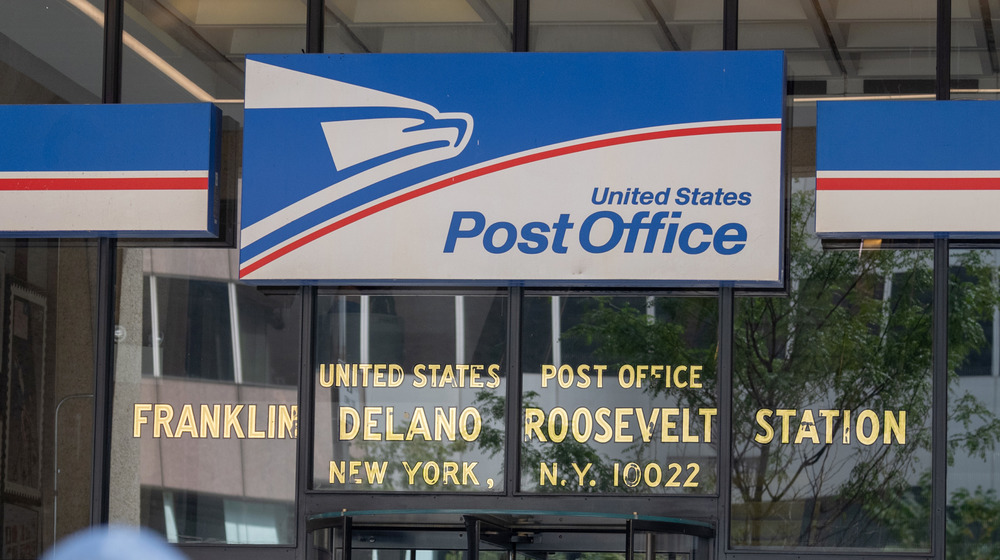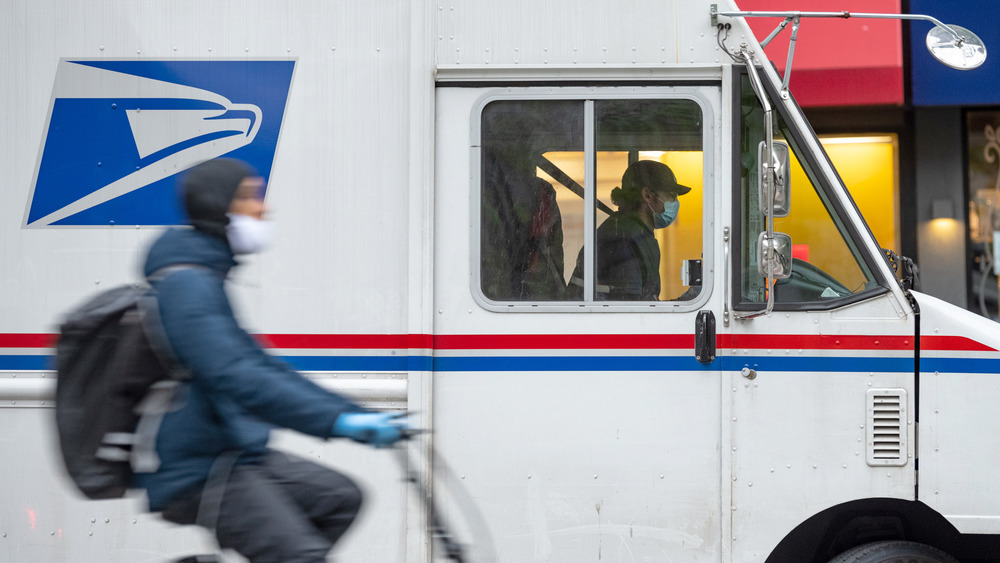Who Owns The Post Office?
"Neither snow nor rain nor heat nor gloom of night stays these couriers from the swift completion of their appointed rounds." According to the historian of the United States Postal Service (USPS), those words, chiseled into the granite above the entrance to New York City's 8th Avenue Post Office, aren't the service's official motto, even though most people think they are. They are actually from the book The Persian Wars by ancient Greek historian Herodotus — who is often referred to as "The Father of History" — in which he described the mounted Persian couriers' ingenious system of getting messages delivered during that empire's war with the Greeks, from 500-449 BCE. "Nothing mortal travels so fast as these Persian messengers," he wrote.
Two-and-a-half centuries later, in August 2020, the USPS issued a press release detailing its third quarter fiscal results amid a relative lull in the coronavirus pandemic. The service's financial outlook did not bode too well for its ability to continue providing such reliable service in the future. But although the pandemic has put a strain on the Post Office, its current problems began long before COVID-19 threw a massive wrench in the cogs of normal life the world over. As the USPS continues to face challenge after challenge to its legal mandate to provide mail service to "as nearly as practicable the entire population of the United States," let's take a look back at the origins and operations of the service.
No one 'owns' the Post Office, and that's the point
As the Brookings Institution reported, the USPS is run like a private business, but it isn't owned like one. Its status as an independent entity in the executive branch of the federal government was created by the 1970 Postal Reorganization Act. Before that it had been the Post Office Department, established in 1792, and was later changed to a Cabinet department in 1872. The first U.S. Postmaster General, appointed in 1775, was Benjamin Franklin, because, of course it was. The guy did everything at the beginning of the United States, besides darn everybody's socks.
The Post Office is governed in the same manner as a large business — it would be on the Fortune 500 list if it were a public corporation — with its operations managed by a Board of Governors. This 11-person committee consists of nine "governors" appointed by the president. The Postmaster General is selected by these governors, and the 10 of them together select the Deputy Postmaster General. This structure is meant to distance the Postal Service from political influence, but the president's opponents claim that has not been the case. According to the Post Office, President Trump has only appointed six governors, and they, along with Postmaster General Louis DeJoy, have failed to select a Deputy Postmaster General. The Guardian reported in August 2020 that the president explicitly stated his opposition to additional funding for the USPS for political reasons.
The Post Office's ever-increasing financial woes
In that August press release, DeJoy said that despite pandemic-related losses being offset by growth in the service's package delivery business, "the reality remains that the Postal Service is in a financially unsustainable position absent significant fundamental change." According to the BBC, DeJoy — who has donated over $1.2 million to political action funds that support the president — has been accused of "sabotaging the election" by making significant changes to mail processing. When asked about the decommissioning of over 600 mail sorting machines before an election expected to see high rates of mail-in voting, the Post Office said it "routinely moves equipment around" to meet various needs, despite the machines being decommissioned, not relocated.
The alleged political attack on the Post Office is merely the latest in a long list of financial troubles the USPS has faced for more than a decade now. According to the Government Accountability Office, the USPS lost $69 billion from 2007-2018. This is due to a number of complex factors, including the rise of email and other forms of digital communication, the Great Recession of 2008, and pension and health benefits obligations legally imposed in 2006.
You could say that the Post Office is owned by all of us, or at least by those of us who still buy and use stamps, but if these fiscal troubles continue to worsen, there may not be a Post Office for anyone to own (or not own) at all.


